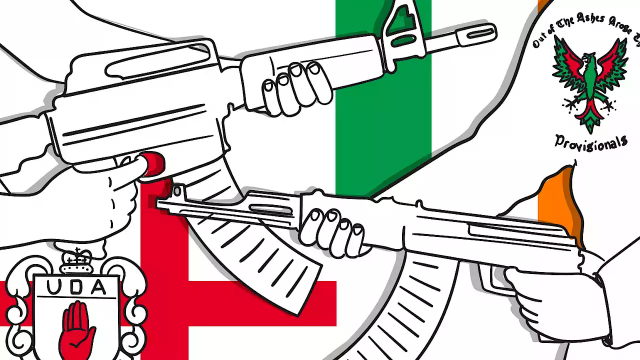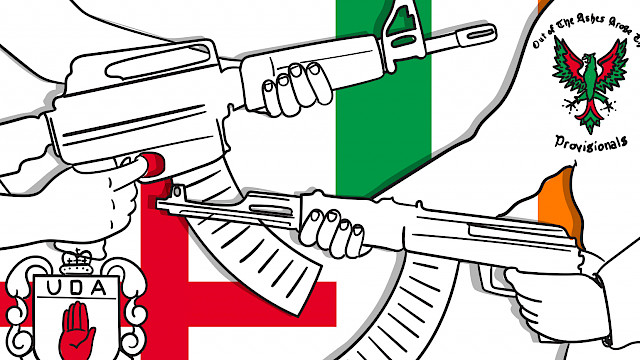James McAuley
CREST Outputs
Projects
Articles
Academic Publications
Radicalization or Reaction: Understanding Engagement in Violent Extremism in Northern Ireland
Over the last decade various theoretical models of radicalization or pathways into engagement in violent extremism have been developed. However, there is a dearth of primary data based on direct contact with violent extremists to test these models.
In order to address this weakness, we analyzed accounts of engagement in violent extremism produced by former Northern Irish loyalist and republican paramilitaries to explore their understanding of how and why they engaged in this seemingly politically motivated violence.
A thematic analysis incorporating aspects of interpretative phenomenological analysis was employed to gain an understanding of these accounts. While the analysis of the interview transcripts produced findings that share similarities with many of the theoretical models, they challenge the importance of ideological radicalization in fueling initial engagement in violent extremism. Instead, the results demonstrate the importance of collective identity, reaction to events, perceived threats, community grievance, and peer and family influences in fueling initial engagement with the armed groups. Insulation and small‐group pressures within the organizations then amplify identity, threat perceptions, and biases, which increase feelings of efficacy and engagement in violence.
Finally, the findings discuss the role of imprisonment in ideologically radicalizing the participants, which in turn allows the paramilitaries to both sustain and rationalize their violent extremism.
(From the journal abstract)
Neil Ferguson & James W. McAuley, 2019. Radicalization or Reaction: Understanding Engagement in Violent Extremism in Northern Ireland. Political Psychology. https://doi.org/10.1111/pops.12618
Staying Engaged in Terrorism: Narrative Accounts of Sustaining Participation in Violent Extremism
Research exploring radicalization pathways and how and why people become involved in terrorism has expanded since the 9/11 attacks. Likewise, over the last decade research exploring de-radicalization and desistence from terrorism has grown and expanded in an attempt to promote exit from extremist or terror groups. However, research studies on how individuals sustain engagement in terrorism and their involvement with extremist organizations, often in the face of great adversity, are absent from the body of research. To address this scarcity of research this study analyzed accounts of engagement in violent extremism produced by Northern Irish loyalist and republican paramilitaries in order to explore how their paramilitary lifestyle, perpetration of acts of political violence and the pressure from countering threats posed by rival groups, and the State security forces impacted on them. The analysis utilized a hybrid of thematic analysis and interpretative phenomenological analysis (IPA). The themes raised through the analysis reflected the psychological, social and economic hardship associated with this lifestyle. The narrative accounts also illustrated psychological changes associated to engagement in violence and from insulation within tightly knit extremist groups. As most of the participants faced incarceration during their paramilitary careers, themes also reflected on the impact imprisonment had on them. The themes explored factors that sustained their involvement, including the role of identity development and identity fusion in sustaining their extremism, the impact of insulated group membership, feelings of efficacy, dehumanization processes, community support, and beliefs in the utility of violence.
(From the journal abstract)
Ferguson, N., & McAuley, J. W. (2020b). Staying Engaged in Terrorism: Narrative Accounts of Sustaining Participation in Violent Extremism. Frontiers in Psychology, 11, 1338.
https://doi.org/10.3389/fpsyg.2020.01338Social movements, structural violence, and conflict transformation in Northern Ireland: The role of loyalist paramilitaries
This article analyzes how social movements and collective actors can affect political and social transformation in a structurally violent society using the case study of Northern Ireland. We focus, in particular, on the crucial role played by collective actors within the loyalist community (those who want to maintain Northern Ireland’s place in the United Kingdom) in bringing about social and political transformation in a society blighted by direct, cultural, and structural violence both during the conflict and subsequent peace process. Drawing on data obtained through in-depth interviews with loyalist activists (including former paramilitaries), the article demonstrates the role and impact of loyalists and loyalism in Northern Ireland’s transition. We identify 5 conflict transformation challenges addressed by loyalist actors in a structurally violent society: de-mythologizing the conflict; stopping direct violence; resisting pressure to maintain the use of violence; development of robust activist identity; and the measurement of progress through reference to the parallel conflict transformation journey of their former republican enemies. The Northern Ireland case demonstrates the necessity for holistic conflict transformation strategies that attempt to stop not only direct attacks but also the cultural and structural violence that underpins and legitimize them. In so doing, the article contributes to a broader understanding of how and why paramilitary campaigns are brought to an end.
(From the journal abstract)
Ferguson, N., McDaid, S., & McAuley, J. W. (2018). Social movements, structural violence, and conflict transformation in Northern Ireland: The role of loyalist paramilitaries. Peace and Conflict: Journal of Peace Psychology, 24(1), 19–26.
https://doi.org/10.1037/pac0000274
Projects
Articles
Academic Publications
Radicalization or Reaction: Understanding Engagement in Violent Extremism in Northern Ireland
Over the last decade various theoretical models of radicalization or pathways into engagement in violent extremism have been developed. However, there is a dearth of primary data based on direct contact with violent extremists to test these models.
In order to address this weakness, we analyzed accounts of engagement in violent extremism produced by former Northern Irish loyalist and republican paramilitaries to explore their understanding of how and why they engaged in this seemingly politically motivated violence.
A thematic analysis incorporating aspects of interpretative phenomenological analysis was employed to gain an understanding of these accounts. While the analysis of the interview transcripts produced findings that share similarities with many of the theoretical models, they challenge the importance of ideological radicalization in fueling initial engagement in violent extremism. Instead, the results demonstrate the importance of collective identity, reaction to events, perceived threats, community grievance, and peer and family influences in fueling initial engagement with the armed groups. Insulation and small‐group pressures within the organizations then amplify identity, threat perceptions, and biases, which increase feelings of efficacy and engagement in violence.
Finally, the findings discuss the role of imprisonment in ideologically radicalizing the participants, which in turn allows the paramilitaries to both sustain and rationalize their violent extremism.
(From the journal abstract)
Neil Ferguson & James W. McAuley, 2019. Radicalization or Reaction: Understanding Engagement in Violent Extremism in Northern Ireland. Political Psychology. https://doi.org/10.1111/pops.12618
Staying Engaged in Terrorism: Narrative Accounts of Sustaining Participation in Violent Extremism
Research exploring radicalization pathways and how and why people become involved in terrorism has expanded since the 9/11 attacks. Likewise, over the last decade research exploring de-radicalization and desistence from terrorism has grown and expanded in an attempt to promote exit from extremist or terror groups. However, research studies on how individuals sustain engagement in terrorism and their involvement with extremist organizations, often in the face of great adversity, are absent from the body of research. To address this scarcity of research this study analyzed accounts of engagement in violent extremism produced by Northern Irish loyalist and republican paramilitaries in order to explore how their paramilitary lifestyle, perpetration of acts of political violence and the pressure from countering threats posed by rival groups, and the State security forces impacted on them. The analysis utilized a hybrid of thematic analysis and interpretative phenomenological analysis (IPA). The themes raised through the analysis reflected the psychological, social and economic hardship associated with this lifestyle. The narrative accounts also illustrated psychological changes associated to engagement in violence and from insulation within tightly knit extremist groups. As most of the participants faced incarceration during their paramilitary careers, themes also reflected on the impact imprisonment had on them. The themes explored factors that sustained their involvement, including the role of identity development and identity fusion in sustaining their extremism, the impact of insulated group membership, feelings of efficacy, dehumanization processes, community support, and beliefs in the utility of violence.
(From the journal abstract)
Ferguson, N., & McAuley, J. W. (2020b). Staying Engaged in Terrorism: Narrative Accounts of Sustaining Participation in Violent Extremism. Frontiers in Psychology, 11, 1338.
Social movements, structural violence, and conflict transformation in Northern Ireland: The role of loyalist paramilitaries
This article analyzes how social movements and collective actors can affect political and social transformation in a structurally violent society using the case study of Northern Ireland. We focus, in particular, on the crucial role played by collective actors within the loyalist community (those who want to maintain Northern Ireland’s place in the United Kingdom) in bringing about social and political transformation in a society blighted by direct, cultural, and structural violence both during the conflict and subsequent peace process. Drawing on data obtained through in-depth interviews with loyalist activists (including former paramilitaries), the article demonstrates the role and impact of loyalists and loyalism in Northern Ireland’s transition. We identify 5 conflict transformation challenges addressed by loyalist actors in a structurally violent society: de-mythologizing the conflict; stopping direct violence; resisting pressure to maintain the use of violence; development of robust activist identity; and the measurement of progress through reference to the parallel conflict transformation journey of their former republican enemies. The Northern Ireland case demonstrates the necessity for holistic conflict transformation strategies that attempt to stop not only direct attacks but also the cultural and structural violence that underpins and legitimize them. In so doing, the article contributes to a broader understanding of how and why paramilitary campaigns are brought to an end.
(From the journal abstract)
Ferguson, N., McDaid, S., & McAuley, J. W. (2018). Social movements, structural violence, and conflict transformation in Northern Ireland: The role of loyalist paramilitaries. Peace and Conflict: Journal of Peace Psychology, 24(1), 19–26.

